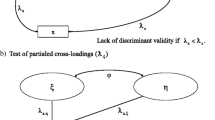Abstract
The need for systemic approaches in empirical research is becoming increasingly apparent. One systemic approach which suggests consideration of various sources of causation is the Aristotelian model of efficient, material, formal, and final causation. Many programs of research fail to consider each of these sources. The use of highly sophisticated methods of analysis to investigate the influence of variables representing only one type of causation is an example of misplaced precision. Conclusions derived from programs of research would be decidedly strengthened and made more definitive if they were based on research concerning all four Aristotelian sources of causation.
Similar content being viewed by others
References
BANDURA, A., & McDONALD, F. J. 1963. Influence of social reinforcement and the behavior of models in shaping children’s moral judgments. Journal of Abnormal and Social Psychology, 67, 274–281.
BENN, A. W. 1914. The Greek philosophers. London: Smith, Elder, & Co.
BRONFENBRENNER, U. 1976. The experimental ecology of education. Educational Researcher, 5, 5–15.
BUNGE, M. 1963. Causality: The place of the causal principle in modern science. New York: World Publishing Co.
ESPER, E. A. 1964. A history of psychology. Philadelphia: W. B. Saunders Co.
HEBB, D.O. 1949. The organization of behavior. New York: Wiley.
HULL, C. L. 1943. Principles of behavior. New York: Appleton-Century-Crofts.
JENSEN, A. R. 1969. How much can we boost I.Q. and scholastic achievement? Harvard Educational Review; 39, 1–123.
KINGSLEY, R., & HALL, V. 1967. Training conservation through the use of learning sets. Child Development, 38, 1111–1126.
PASSOW, A. H., & ELLIOT, P. L. 1968. The nature and needs of the educationally disadvantaged. A. H. Passow (Ed.), Developing programs for the educationally disad-vantaged. New York: Columbia University Teachers College Press.
PIAGET, J. 1948. The moral judgment of the child. Glencoe, Ill.: Free Press.
PIAGET, J. 1970. Piaget’s theory. P. H. Mussen (Ed.), CarmichaeVs manual of child psychology. Vol. 1. New York: Wiley.
REESE, H. W., & OVERTON, W. F. 1970. Models of development and theories of development. L. R. Goulet & P. B. Baltes (Eds.) Life-span developmental psychology: Theory and research. New York: Academic Press.
ROBINSON, D. N. 1976. An intellectual history of psychology. New York: Macmillan.
SIGEL, I., ROEPER, A., & HOOPER, F. 1966. A training procedure for acquisition of Piaget’s conservation of quantity: A pilot study and its replication. British Journal of Educational Psychology, 36, 301–311.
STUMPF, S. E. 1966. Socrates to Sartre: A history of philosophy. New York: McGraw-Hill.
TOULMIN, S. 1960. The philosophy of science: An introduction. New York: Harper.
Author information
Authors and Affiliations
Rights and permissions
About this article
Cite this article
Griffore, R.J. Toward an Aristotelian Analysis of Causation in Psychological Research. Psychol Rec 28, 181–185 (1978). https://doi.org/10.1007/BF03394525
Published:
Issue Date:
DOI: https://doi.org/10.1007/BF03394525



